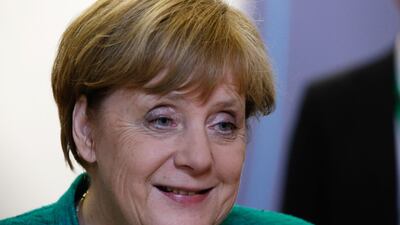Germany's chancellor Angela Merkel appeared to have strengthened her position at the head of her restive coalition on Friday after a hard-fought deal on migration following marathon talks with her European Union counterparts.
A deal on migration announced early on Friday made only vague pledges to strengthen external borders and to set up processing centres outside of the EU, but it appeared enough to placate her hardline coalition partners.
After disastrous elections last year, Mrs Merkel’s fragile coalition relies on the support of a Bavarian sister party, which demanded significant concessions at the talks in Brussels after threatening to close Germany’s borders to migrants. The move could have triggered the collapse of her three-month-old government as well as the EU's Schengen zone of free travel.
Hans Michelbach, deputy leader of Bavaria’s Christian Social Union, said Friday that he wanted to continue the partnership with Mrs Merkel’s Christian Democrats, to prevent the collapse of the coalition and likely new elections.
"We want to work together. The alliance … has absolute priority,” he told ARD television. He said the summit’s conclusions were a positive signal. “The question is about what's next for national borders and the integration of migrants in the next months."
Mr Michelbach’s comments came after European leaders struggled to overcome deep divisions on migration at a tense EU summit that dragged into the early hours on Friday.
The meeting in Brussels, dominated by a nine-hour dinner, underscored how Europe's 2015 spike in immigration continues to haunt the bloc despite a sharp drop in arrivals of people fleeing conflict and economic hardship in the Middle East and Africa.
It took place in an atmosphere of political crisis because of the pressure on Mrs Merkel and a new eurosceptic Italian government threatening to torpedo any deal that did not meet its demands.
A bleary-eyed Mrs Merkel, speaking to reporters at 5am tried to put a positive spin on the result, saying it was a good signal that leaders had been able to agree a common text on the controversial migration issue.
But she acknowledged that the bloc still had "a lot of work to do to bridge the different views."
"Italy is not alone anymore," said Italian Prime Minister Giuseppe Conte.
French President Emmanuel Macron said European cooperation had "won the day".
_________________
Read more:
EU leaders reach migration deal after all-night talks
Merkel's make or break deal on EU migration
_________________
In a final statement full of convoluted language meant to satisfy the divergent views, the leaders agreed to set up joint asylum processing sites and restrict migrant moves within the bloc, but they made clear that virtually all of their pledges would be carried out on a "voluntary basis" by member states.
They also agreed to tighten their external border and increase financing for Turkey, Morocco and other North African states to prevent migration to Europe.
Diplomats described a tense, tortured meeting with small groups of leaders huddled together in a desperate bid to break the deadlock and avert the humiliation of heading home without having produced an agreement.
Early in the evening, Mrs Merkel and Mr Conte set aside 45 minutes for a chat, only to break it off after 20 minutes when the Italian leader rejected the German leader's overtures, according to diplomats.
Before the dinner clash over migration started, Mr Conte, head of a new government that includes the anti-establishment 5-Star movement and far-right League, refused to endorse a summit text on security and trade until other leaders had bowed to his demands to help Italy manage the Mediterranean arrivals.
That forced the summit chairman Donald Tusk and European Commission President Jean-Claude Juncker to cancel their pre-planned news conference.
"It is so toxic. They go into the room, clash, storm out, go back again, clash again. With no end in sight," said one exasperated diplomat as dawn approached.
"It's pure politics driving this, emotions are flying as high as back in 2015," another EU diplomat said.
Fewer than 45,000 migrants have made it to the European Union this year, according to United Nations data, a sharp drop from the tidal wave of 2015 when many thousands were entering on a daily basis.
But the political tremors are still being felt across Europe, with populist, anti-immigrant parties on the rise in many countries.
Ex-communist easterners led by Poland and Hungary are still refusing to accept a share of the new arrivals to alleviate the burden on countries like Italy and Greece.

